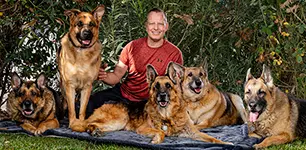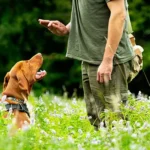
Hiring a dog trainer can be a daunting task. You are confronted with many certifications you have never heard of and have no idea what they mean. You can search online but are those ratings meaningful? Are their reviews genuine? It can be hard to know what to look for. And then, all kinds of groups and well-meaning people have lots of opinions on what you should do. None of that makes it easier. This article gives you some pointers on how to make that search more successful.
Finding Leads
In my view, the best way to hire a great dog trainer is to look for people trained and certified by some of the best trainers in the world. Some trainers have built a stellar reputation of excellence over decades. Anyone they train and certify can be considered above the pack. These professionals don’t hand their certifications out like candy. You have to earn them through demonstrations of knowledge and skill in front of their critical eyes. Unfortunately, too many dog trainer schools don’t have such high standards. Too many were franchised when they shouldn’t have been. Even when the founders were great trainers, many franchises struggled to maintain the same standards.
Regardless of the trainer’s qualifications, you still want to interview them. You want to be confident their style works for you. There will be differences in form. But, at least you can rest assured that they have a solid understanding of learning science, understand dogs, treat them respectfully, and possess high-level skills. Here are the best starting points for finding a great trainer.
1st Tier Resources for Hiring a Dog Trainer
- The Training without Conflict Directory – this is Ivan Balabanov’s certification group. Ivan is considered one of the best dog trainers in the world. He is a two-time world champion in one of the most complex dog sports and has extensive experience in any field of dog training you can imagine. He knows how to train any dog to the maximum of its ability. His certification has meaning. It is hard to obtain and must be re-certified annually. Any trainer listed in this directory is someone I would trust with my dog. I am part of this selected group of trainers as well. Ivan himself is located in Tampa Bay, FL.
- Graduates from the Immersion Program at the Michael Ellis School for Dog Trainers – Michael is another extraordinary trainer. He is known worldwide for his exceptional skills and training programs. Michael is located in Santa Rosa, CA, and all his Immersion Program graduates can be expected to know what they are doing.
- Bart Bellon’s NePoPo Gold School graduates should also have a solid understanding of dog training. I have seen too many variations in how some of these trainers approach dogs to recommend them outright wholeheartedly, as I did with 1) and 2). But, you can count on them having good knowledge. Just check you like the attitude towards dogs of the individual trainer. There are many great ones, but some I would stay away from. Bart has a stellar reputation. He is located in Belgium but holds seminars all over the world.
2nd Tier Resources for Hiring a Dog Trainer
- The International Association of Canine Professionals is the next one in line. I also belong to this organization. The quality checks are good for Certified Dog Trainer (IACP CDT) and Certified Dog Trainer Advanced (IACP CDTA). But they don’t come anywhere near the first three. However, many more people are in that directory, and all CDTAs should have good skills. There are other dog trainer organizations. I list only this one because it has no agenda on how someone should train dogs. The IACP cares about trainers having good skills and broad education. Their annual conference is focused on education. They are open to all canine professionals. Many other organizations are pushing training agendas and ideologies, which doesn’t help find a qualified trainer.
- Thumbtack is a free online service to find contractors, including dog trainers. Here, you have to rely on the client reviews as there is no vetting of dog training skills. Unlike Yelp, their reviews can be considered genuine. But remember that people’s perceptions and opinions of someone’s skillset are subjective. Here quantity is a good indicator. The provider is probably good if you see 10-20 good (4-5 stars) reviews yearly.
- Lastly, referrals! Ask friends, neighbors, co-workers, pet sitters, groomers, or local vets. Maybe they have a dog trainer recommendation for someone they know well or have hired themselves in the past.
This Wasn’t a Comprehensive List
Many great trainers don’t fall into the six categories above. Dog training is tradecraft. It is passed on from generation to generation through internships and hard work. Many trainers learned from multiple great resources and became excellent over time. Please don’t dismiss dog trainers without credentials. This article is intended to help you focus your search and find someone qualified you like. If a friend had a great experience with another dog trainer, please call them too. Add them to your list of trainers to interview.
Interview Multiple Trainers
Once you have narrowed down your call list, schedule interviews and ask everything you want to know but avoid demanding training or behavior modification to be done in a specific way. You called a professional for help because you were overwhelmed with your dog’s challenges. After the professionals offer their thoughts, asking why they think these are the best options is okay. However, you shouldn’t expect a detailed diagnosis or resolution at this point. Any professional will want to meet you and your dog first before providing more details. Remain open to their diagnosis differing from yours.
Any knowledgeable professional will always ask you questions about your dog and your specific problems. They will want to know about your dog’s behavior, background, and daily routine. They also might inquire about possible health conditions relevant to the problem; when hiring a dog trainer, you want to answer their questions honestly and completely. You will get a better trainer that way.
Consultations
Many reputable professionals will offer to meet you before hiring to evaluate challenges first-hand and to get to know each other. This is a good idea. You want to be comfortable with the person before hiring a dog trainer. You will spend many hours together or send your dog to them for training. Sometimes in-person consultations are free. Sometimes, they are not. The more experienced the trainer is, the more likely they will charge for their time.
Reputable trainers will take their time during consultations and training sessions to answer all questions and want you and your family to be part of the training process.
Trainers who want to jump straight into scheduling without taking the time to answer your questions will probably be similarly brief after you hire them. Stay away from dog trainers offering comprehensive, remote diagnosis without meeting your dog. They may offer their best guess based on your descriptions. Expect their assessment to be updated or changed once they meet your dog.
Respect Professional Advice
When I receive an initial phone call, one of the requests I receive regularly is, “We want positive reinforcement only.” While I appreciate the motivation behind this request, it is the wrong starting point. In my experience, these requests usually mean the client had a bad experience with a previous trainer. Or they read horrible stories of animal abuse at training facilities. Most of my clients come through referrals. And most have had bad experiences in the past, so I understand their fears.
However, positive reinforcement is only one component of proper obedience or behavioral training. Before the situation is assessed in its entirety, it’s impossible to decide what approach would be most effective. You probably won’t tell a plumber or mechanic how to do his job. Let the dog professional be your guide about what is appropriate. If you have problems with the presented approach, you don’t have to hire that dog trainer. You can always look elsewhere but be open to hearing them out first.
A former client didn’t like the approach the first trainer she spoke with recommended, so she continued interviewing other trainers. She hoped to find a trainer to tell her what she wanted to hear. In doing so, she discovered that every trainer she spoke with recommended a similar approach for her aggressive dog. She became my client, and I helped her resolve her dog’s aggressive behaviors. Still, it took a lot of convincing and explaining before she was ready to accept that some punishment had to be part of the solution.
The “Positive Only” Fallacy
Generally, positive reinforcement as the exclusive approach to dog training has limitations. I heard an instructor say in a seminar, “the problem with positive reinforcement is how well it works until it doesn’t.” That’s a good way of putting it. There comes a time during any dog training program when you have to say no to your dog. It also fundamentally ignores how dogs learn. Trainers, who claim that positive reinforcement is all they use, usually don’t understand the correct terminology of their methods. However, positive reinforcement is essential in any training or behavior modification approach. You need that; it’s just not the only thing. Please check out my article on Positive Dog Training for (a lot) more information.
Board & Train
Another frequent request is to take dogs in for boarding and training. Our board-and-train program is one of our most popular and usually books up months in advance. A board-and-train program can be an excellent way for the right training goals, but it’s not always the best approach. We affect our dogs with all we do and don’t do. As an owner, you are part of the solution. A dog is not a car you take to the shop for fixing. The relationship between you and your dog is a vital element.
It is productive to work with a dog by itself when we teach new skills, especially with puppies, or if a dog needs serious rehabilitation that can’t be done effectively in the owner’s home. However, the owner has to become part of the training process at some point to make the training successful in the long run.
The Owner-Dog Relationship
Every dog is different. Claiming a specific issue can be resolved in x number of hours before meeting your dog is ridiculous. No skilled professional does that. The best a dog professional can do is to provide an estimate based on their experience. How fast or slow you achieve your goals depends largely on your participation.
In my experiences with dog-owner relationships, I have seen various outcomes. Two stand out in my mind. One pit bull who was antagonistic and aggressive toward people transformed into a friendly, sweet dog within two months. At the other end of the spectrum, I had a reasonably mellow Labrador that the owners couldn’t control on walks. Even after four months, the owners had not accepted their role in this behavior and continued to have problems— but only when the owner walked him. With me, he was fine. The owner’s emotions and fears caused the dog to react the way he did. The dog never felt safe with his owner.
The pit bull owners showed 100 percent dedication to nipping their problem in the bud. The Labrador owners didn’t seem to make much effort outside the training sessions. Both of these examples are atypical and only serve as an illustration of what is possible.
Changing a dog’s behavior is a process and involves the owner. Owners unknowingly exacerbate—at least in part—most problem behaviors. As a result, they are part of the solution as well.
In Summary
- Pick a trainer with experience and credentials, but don’t let certifications blind you. Investigate them. Some certifications mean a lot. Some mean little to nothing.
- Keep an open mind when hiring a dog trainer. The problem may be different from what you think it is.
- Skip social media. Trainers with fancy accounts and many followers are not spending time becoming better dog trainers.
- Facilitate selecting the correct type of professional by preparing a set of questions to ask before making a hiring decision.
- Take responsibility for your share of the goals. Your dog needs you to be part of the training process.
- Pick someone who understands your challenges and doesn’t try to push an ideology.
- Hire someone who feels right to you based on your interview.
- Never hesitate to keep looking if someone seems off. You must be comfortable with your choice.
Play the Audio





